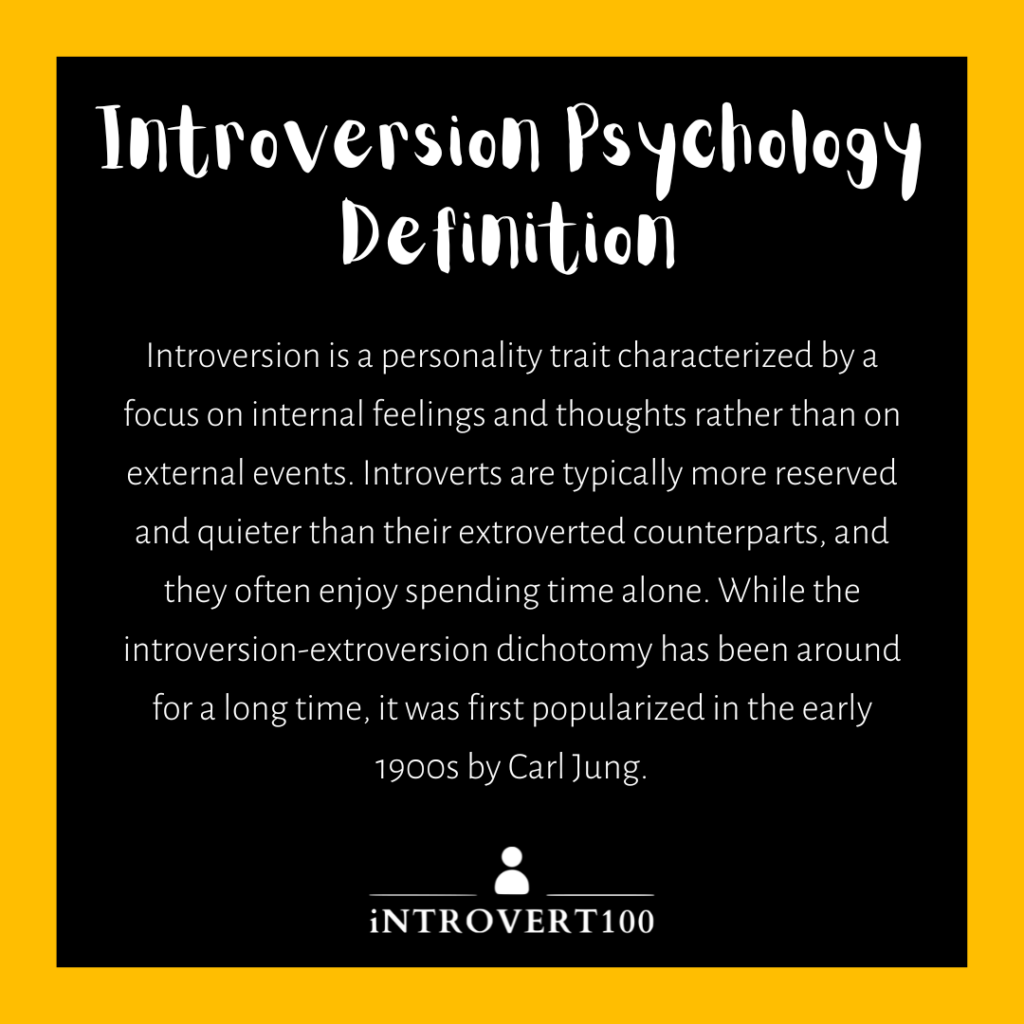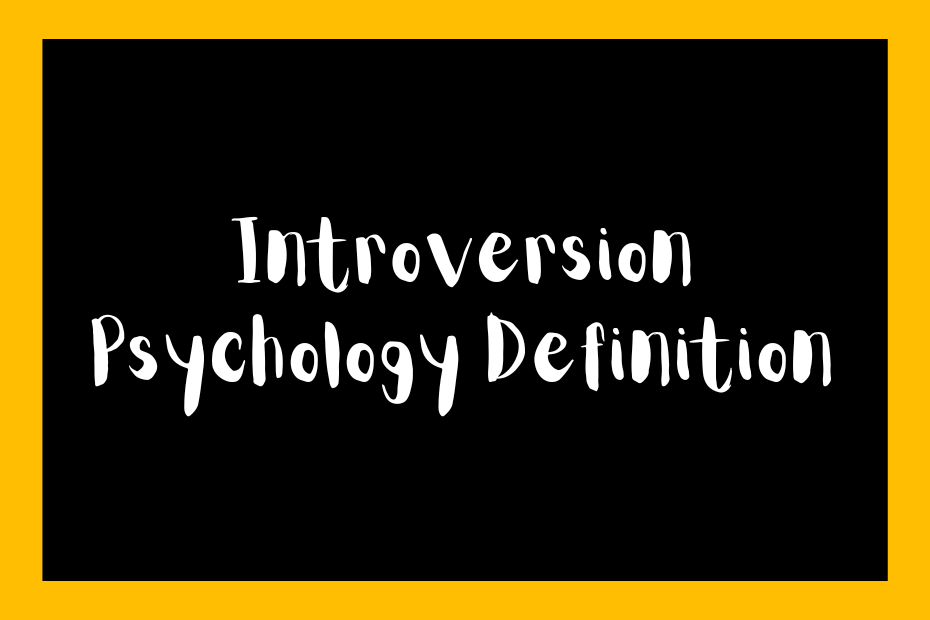Would you like to know what the introversion psychology definition is? Introversion is a personality trait characterized by a focus on internal feelings and thoughts rather than on external events. Introverts are typically more reserved and quieter than their extroverted counterparts, and they often enjoy spending time alone. While the introversion-extroversion dichotomy has been around for a long time, it was first popularized in the early 1900s by Carl Jung.
Introversion is not a mental disorder, and it is not inherently bad. In fact, many great thinkers and leaders throughout history have been introverted. However, there are some challenges that come with being an introvert, such as feeling misunderstood or struggling in social situations. If you are an introvert, it is important to understand yourself and your needs, and to find ways to thrive in an extroverted world.

What is introversion and what are the benefits of being an introvert
Introversion is a personality type characterized by a focus on internal feelings rather than on the external world. Introverts are often quieter and more reserved than other people and prefer to spend time alone or with a small group of close friends.
While there are many misconceptions about introversion, studies have shown that there are many benefits to being an introvert. These include better listening skills, increased creativity, and stronger relationships.
Where does the introversion psychology definition come from?
The term “introversion” was first popularized in the early 1900s by Swiss psychiatrist Carl Jung. He described introverts as being more “inner-directed” and extroverts as being more “outer-directed.” This is where the introversion psychology definition comes from.
How to know if you’re an introvert
Are you an introvert? It can be hard to tell. After all, many people display both introverted and extroverted qualities depending on the situation.
But there are a few key signs that can help you determine whether you lean more towards the introverted side of the personality spectrum or not.
If any of these sound like you, then there’s a good chance you’re an introvert:
– You recharge your energy by spending time alone
– You don’t mind being alone for extended periods of time
– Small talk doesn’t come easily to you
– You feel drained after socializing
– Being in crowds makes you feel anxious or overwhelmed
If most of these points ring true for you, don’t worry – there are plenty of ways to work with your introverted nature and make the most of your strengths.
Why is the Introversion Psychology Definition is good to know?
The Introversion Psychology Definition is good to know because it helps you to understand yourself and others better.
It is also useful in choosing the right career, friends, and partners.
The challenges of being an introvert and how to overcome them
Introversion has been gaining a lot of attention in psychology circles lately. This is because introverts make up 30% of the population, and yet there are many misconceptions about what it means to be an introvert.
In essence, introversion is simply a personality trait that refers to how people recharge their energy. Introverts gain energy from spending time alone or with close friends, while extroverts gain energy from being around lots of people.
Unfortunately, due to the way our society is structured, introverts often find themselves at a disadvantage. They are seen as shy or aloof, when really they’re just drained after socializing for too long.
Thankfully, there are ways for introverts to overcome these challenges and thrive in an extroverted world. Here are four tips:
1. Schedule “me” time:
It’s important for introverts to schedule time for themselves, whether it’s reading, taking a walk, or just sitting in silence. This is how they recharge their batteries and prepare for social interactions.
2. Find a balance:
In order to avoid being overwhelmed, introverts need to find a balance between alone time and socializing. This might mean attending one party a week instead of two, or only hanging out with close friends.
3. Be honest:
One of the hardest things for introverts is pretending to be someone they’re not. It’s important to be honest about your introversion with others, so they can understand and accommodate your needs.
4. Seek out like-minded people:
There is strength in numbers! Introverts should seek out other introverts, so they can relate to each other and build a supportive network.
If you’re an introvert, don’t despair – you can still lead a happy, fulfilling life. Just remember to take care of yourself and to be honest about your needs.
What are your thoughts on introversion? Do you have any tips to add? Let us know in the comments!
How to thrive as an introvert in a world that is often geared towards extroverts
As an introvert, you might sometimes feel like you’re swimming against the current. In a world that often values extroversion and groupthink, it can be difficult to thrive as an introvert. But with a few simple tips, you can learn how to make the most of your unique personality and start enjoying life to the fullest.
First, it’s important to understand what introversion is. Introverts are people who gain energy from spending time alone, while extroverts gain energy from being around other people. This doesn’t mean that introverts are shy or anti-social – in fact, many introverts are very social creatures. They simply prefer smaller groups or one-on-one interactions over large gatherings.
If you’re an introvert, it’s important to know that there is nothing wrong with you.
You just have a different way of processing information and interacting with the world. And that’s okay! In fact, introverts often have many strengths that extroverts don’t, such as the ability to focus deeply on a task or think creatively.
There are a few key things you can do to thrive as an introvert in a world that is often geared towards extroverts.
First, it’s important to understand your own needs and limits. Introverts often need more time alone than extroverts, so it’s important to make sure you schedule in some “me time” every day. Whether it’s taking a long walk by yourself, reading a book in your backyard, or just taking a few moments to meditate, spending time alone can help you recharge and feel more ready to take on the world.
It’s also important to be strategic about social interactions. If you know you’re going to be attending a large event or gathering, try to schedule in some down time before and after. This will give you a chance to rest and recover from all the stimulation.
Finally, don’t be afraid to stand up for yourself. If you need to say no to plans or turn down invitations, do so without feeling guilty. It’s important to listen to your introverted self and not push yourself beyond your limits.
By following these simple tips, you can learn how to thrive as an introvert in a world that is often geared towards extroverts. Embrace your unique personality and use it to your advantage!
Tips for managing anxiety and social anxiety as an introvert
Most people think of introverts as shy and retiring, but that’s only one side of the coin. Introversion is actually a personality trait characterized by a preference for solitude and low social interaction.
While some introverts are shy, others simply feel drained after too much socializing and need time alone to recharge.
Regardless of the reason, there are ways to manage anxiety and social anxiety as an introvert.
Below are eight tips that can help.
- Understand your triggers
Every introvert is different, so it’s important to know what triggers your anxiety.
Common triggers include large crowds, loud noise, and small talk.
Once you know what your triggers are, you can start to plan how to avoid or manage them.
2. Plan ahead
If you know you’re going to be in a situation that triggers your anxiety, it can help to plan ahead.
Think about what you’ll need to do to manage your anxiety and make a plan for how you’ll
escape the situation if necessary.
3. Schedule time for yourself
It’s important to schedule time for yourself, even if you’re not anxious.
This will give you time to do the things you enjoy and recharge without having to worry about social interaction.
4. Find a support system
Having a support system of friends or family members who understand your introversion can be helpful.
They can provide a listening ear and a shoulder to cry on when you’re feeling anxious or down.
5. Talk to a therapist
If your anxiety is impacting your quality of life, it may be time to seek professional help.
A therapist can help you understand and manage your anxiety.
6. Join a support group
Support groups provide a safe space to share your experiences and connect with others who understand what you’re going through.
This can be helpful in managing anxiety and social anxiety.
7. Try medication
If your anxiety is severe, medication may be an option.
There are many different types of medications that can help with anxiety, so it’s important to work with a doctor to find one that’s right for you.
8. Practice relaxation techniques
Relaxation techniques can be helpful in managing anxiety.
Some relaxation techniques that may help include deep breathing, meditation, and yoga.
By understanding your triggers and learning how to manage them, you can live a full and happy life as an introvert.
What works for you may vary, so it’s important to experiment and find what works best for you.
With a little effort, you can learn to manage your anxiety and social anxiety and live the life you want.
The power of solitude and how to find peace in your own company
Introversion is a personality trait characterized by a focus on internal thoughts and feelings rather than on the external world. Introverts are typically more reserved and introspective than their extroverted counterparts.
While there is no single definition of introversion, there are several key characteristics that are often associated with this personality type.
There is no need to over analyze the introversion psychology definition because it is quite simple. It is the personality trait of someone who prefers to spend time alone rather than in social situations.
Some people mistakenly believe that introverts are shy, but this is not always the case. Shyness is a separate issue from introversion, and many introverts are not shy at all. In fact, introverts can be quite outgoing and gregarious when they are comfortable in a situation.
Introverts typically enjoy spending time alone or with a few close friends, while they may find large crowds or social situations overwhelming. They tend to be more reflective and analytical than spontaneous or energetic, and they may prefer quiet, calm environments to busy, noisy ones.
Despite the common misconception that introversion is synonymous with shyness or social anxiety, introverts can be just as socially confident as extroverts. However, they typically prefer to avoid small talk and instead have deep and meaningful conversations.
There are many benefits to being an introvert. Introverts often have rich, complex inner lives and can be very creative and insightful. They often have strong intuition and make great listeners.
If you’re an introvert, there are a few things you can do to help you find peace and happiness in your own company. First, it’s important to understand and embrace your introverted nature. Don’t try to change who you are – just work with your strengths.
Secondly, it’s important to find activities and environments that appeal to your introverted nature. If you enjoy spending time alone, find activities that allow you to do so without feeling lonely or isolated. If you prefer quiet environments, seek out activities or jobs that allow you to work from home or in a quiet office setting.
Finally, it’s important to build a strong support network of like-minded individuals who will understand and appreciate your quirks. These people can provide a valuable listening ear when you need it, and can also offer helpful insights and advice when needed.
How to use your introverted strengths to your advantage
Introverts are often unfairly labeled as shy, or unassuming. The truth is, introverts have a lot of hidden strengths which, when used correctly, can be a huge advantage in life.
Introversion is simply a personality trait characterized by preferring less stimulation from the external world. This can be both a good and bad thing – while on one hand it can mean that introverts are more easily overwhelmed than others, it also means that they have an incredibly rich inner world which they can draw upon for strength and creativity.
Here are some tips on how to use your introverted strengths to your advantage:
1. Use your creativity
– One of the best things about being an introvert is that you have a very rich inner world. This can be a great advantage when it comes to creative endeavors, as you can draw upon your own experiences and imagination to create new and innovative things.
2. Focus on your strengths
– Everyone has their own unique set of strengths and weaknesses. As an introvert, it’s important to focus on your strengths and use them to your advantage. This could mean using your introverted nature to your advantage in a more quiet and introspective profession, such as writing or research.
3. Don’t be afraid to ask for help
– Just because you’re an introvert doesn’t mean you have to do everything on your own. If you feel like you need help, don’t be afraid to reach out to others and ask for assistance.
4. Embrace your introverted side
– One of the best things you can do for yourself is to accept and embrace your introverted nature. This doesn’t mean that you have to avoid social situations or always be alone, but it does mean that you should make time for activities that allow you to recharge and relax, such as reading, spending time in nature, or listening to music.
In Conclusion
By understanding the introversion psychology definition and learning to use your introverted strengths to your advantage, you can live a more fulfilling and successful life. Embrace your introverted side and use it to your advantage!
There are many benefits to being an introvert – Introverts often have rich, complex inner lives and can be very creative and insightful. They often have strong intuition and make great listeners.
If you’re an introvert, there are a few things you can do to help you find peace and happiness in your own company.
First, it’s important to understand and embrace your introverted nature. Don’t try to change who you are – just work with your strengths.
Secondly, it’s important to find activities and environments that appeal to your introverted nature. If you enjoy spending time alone, find activities that allow you to do so without feeling lonely or isolated. If you prefer quiet environments, seek out activities or jobs that allow you to work from home or in a quiet office.
Lastly, it’s important to remember that you don’t have to be alone to feel happy and fulfilled. Seek out social situations that are enjoyable and make you feel comfortable. If you find yourself in a situation that is draining or overwhelming, don’t hesitate to leave early or take a break.
The introversion psychology definition is good to know, but by understanding and accepting your introverted nature, you can find ways to live a happy and fulfilling life.




